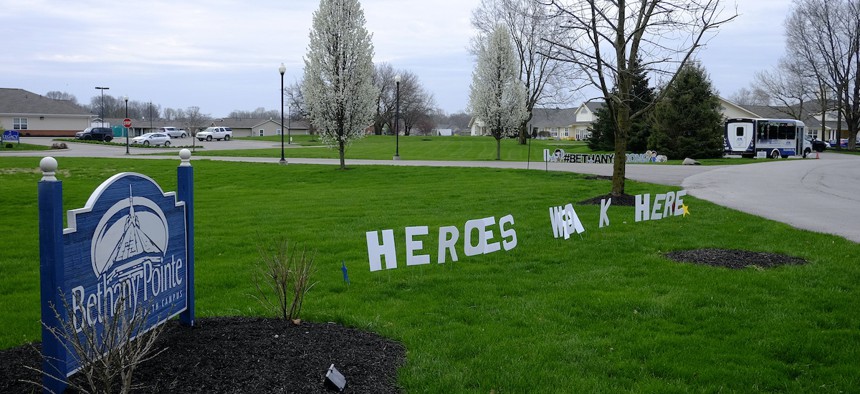One State Will Deploy National Guard to Nursing Homes

A sign is displayed at the Bethany Pointe Health Campus, Saturday, April 11, 2020, in Anderson, Ind. Multiple residents at the Indiana nursing home have died from Covid-19. Associated Press
Indiana Gov. Eric Holcomb said the National Guard will take over employee health screenings, data entry and other tasks to allow staff members to focus on patient care.
Indiana will deploy members of the National Guard to long-term care facilities to provide support for “overwhelmed” staff eight months into the coronavirus pandemic, Gov. Eric Holcomb announced last week.
“There is fatigue there,” Holcomb, a Repubican, said at a weekly coronavirus briefing. “You’re seeing that, we’re hearing that when you’re on the ground, so over the next couple weeks we’ll take additional steps to directly support and further partner with these facilities.”
The deployments, part of a larger plan to reduce the spread of the novel coronavirus in the state’s nursing homes, will begin Nov. 1 in facilities with reported outbreaks. The National Guard members will take primary responsibility for data entry, employee health screenings and infection control practices, allowing facility staff to “rightly focus on what they do best, and that’s caring directly for residents,” Holcomb said.
Nursing home residents account for 58% of Covid-19 deaths in Indiana, a situation Holcomb said that state officials had been bracing for since the initial onset of the pandemic. Senior citizens are more at risk of severe illness from the virus, particularly if they have underlying conditions. Group settings and close quarters in long-term care facilities also meant that residents there are inherently more vulnerable, he said. Nationwide, nursing home residents account for roughly a quarter of coronavirus deaths, according to federal data.
“This is not unique to the state of Indiana,” Holcomb said. “It doesn’t make it any easier to deal with, but it’s happening across the nation.”
The state will also provide additional long-term staffing support through its health-care reserve workforce, a system that pairs retired or out-of-work health professionals with facilities in need. Facilities will also receive more personal protective equipment—2 million N95 masks, 400,000 face shields and 680,000 gowns—to ensure that staff members can be properly outfitted during patient interactions.
Officials said the multi-pronged strategy is necessary as Covid-19 surges throughout the state. Twice as many residents are hospitalized with the virus now compared to late June and early July, said Dr. Lindsay Weaver, chief medical officer for Indiana’s health department. Rising infection rates are particularly stressful for care facilities, she said, causing staff levels to dip as employees quarantine after exposure and remaining workers devote extra time to Covid-19 patients.
"I want to take a moment to acknowledge our health-care workforce, and acknowledge the fact that they are exhausted. They have been running a marathon at a sprint pace for eight months. And the human body simply isn't designed to sustain such a pace," Weaver said. "These measures are intended to not only protect residents of these facilities, but provide some relief to the staff who have been working around the clock to help care for them."
Kate Elizabeth Queram is a staff correspondent for Route Fifty and is based in Washington, D.C.
NEXT STORY: Texas Must Act Fast to Protect its Voters Against “Pink Slime” Journalism





